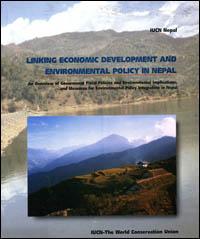Government policies on agriculture, forestry, water, energy and industry have tacitly encouraged over-use of the country's natural resources. The consequent exploitation of natural resources has had a negative impact on productivity by raising production and maintenance costs and aggravating the problem of biodiversity conservation. The high degree of conversion of existing natural resources, such as forest into land, has necessitated a proper investigation of the trade-off between the cost and benefits of such conversion. The study addresses selected government policies and their implications for the environment and suggests measures for integrating economic and environmental poliy in Nepal. A general analysis of the status of environmental economics in Nepal is given. Also discussed is the economic valuation of natural resources and environmental services with the help of physical linkages and the behavioral approach
Includes bibliographic references

